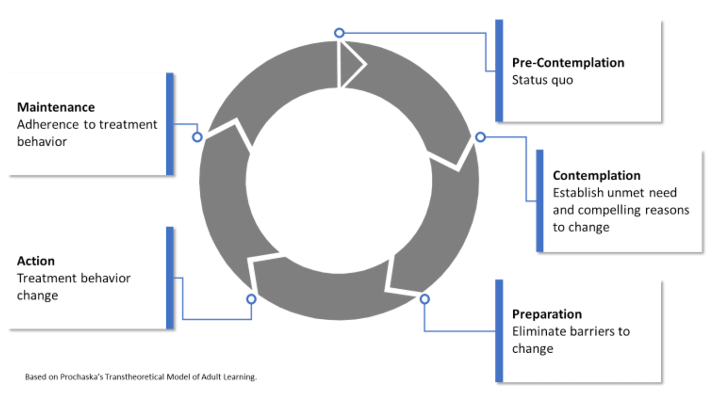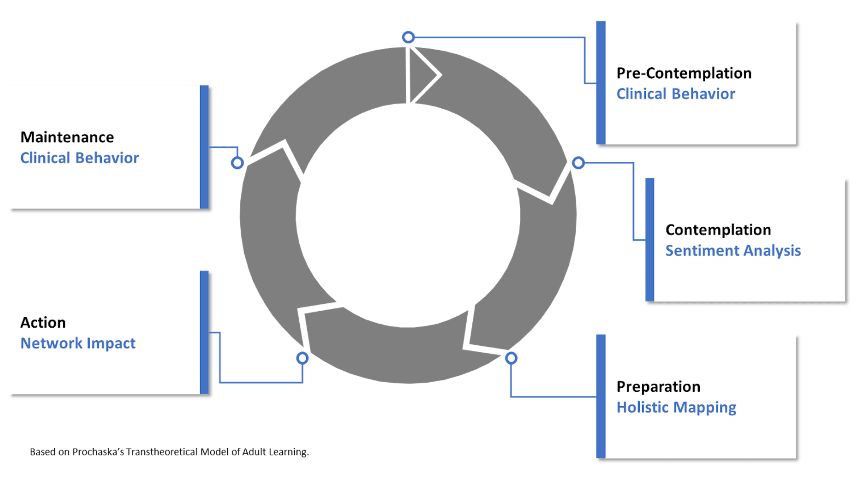In the fast-paced world of healthcare, the role of Medical Science Liaisons (MSLs) has become increasingly crucial in bridging the gap between scientific research and clinical practice. One key aspect of MSLs’ responsibilities is to effectively communicate scientific and clinical information to healthcare professionals using various channels. In this article, we will explore a behavior change framework designed to enable appropriate clinical practices, drawing insights from Prochaska’s Transtheoretical Model of Behavior Change.

Role of Medical Affairs:
Medical affairs professionals play a pivotal role in disseminating scientific and clinical information to the medical community through diverse communication channels. By staying up-to-date with the latest research findings and clinical guidelines, MSLs can provide valuable insights to healthcare professionals, facilitating evidence-based decision-making in patient care.
Despite the availability of new clinical practice guidelines, studies suggest that significant delays occur in their implementation into practice. Through targeted educational initiatives, MSLs can play a critical role in bridging this gap, ensuring that evidence-based practices are effectively integrated into healthcare settings to enhance patient outcomes.
Behavior Change Framework:
Prochaska’s Transtheoretical Model of Behavior Change serves as a foundational framework for understanding and implementing behavior change strategies in clinical practice. The model delineates various stages of change, including pre-contemplation, contemplation, preparation, action, and maintenance, each requiring distinct interventions to facilitate optimal behavior change.

Pre-Contemplation: Assessing Alignment to Guidelines:
One essential aspect of MSLs’ work involves monitoring healthcare professionals’ adherence to clinical guidelines. By conducting real-world data assessments and evaluating treatment behaviors relative to established guidelines, MSLs can identify opportunities for improvement and support healthcare providers in delivering high-quality, guideline-adherent care.
Preparation and Action: Peer Influence on Treatment Decisions:
The influence of peers and key opinion leaders can significantly impact treatment decisions in clinical practice. By evaluating and leveraging peer connections, MSLs can enhance the adoption of evidence-based practices and contribute to a culture of continuous learning and improvement within healthcare networks.
Maintenance: Measuring Clinical Practice Change:
To gauge the effectiveness of their interventions, MSLs must establish robust mechanisms for measuring and tracking changes in clinical practice. By collecting and analyzing data on patient management evolution, MSLs can assess the impact of their interactions on practice behaviors and patient outcomes.
Conclusion:
In conclusion, MSLs play a pivotal role in driving behavior change and promoting evidence-based clinical practices within healthcare settings. By embracing behavior change frameworks, leveraging peer influence, and measuring practice changes, MSLs can advance the quality of patient care and contribute to positive health outcomes. Adoption of a structured approach to behavior change can empower MSLs to enhance their impact and drive meaningful improvements in clinical practice.
About the author:

Susan Abedi
Susan has more than 20 years of strategy advisory experience in the pharmaceutical industry. As Chief Strategy Officer, Susan focuses on developing robust, analytics-driven healthcare solutions tailored to clients’ specific market challenges and product needs.